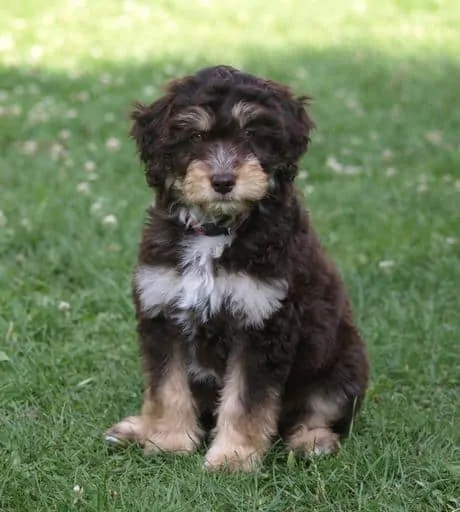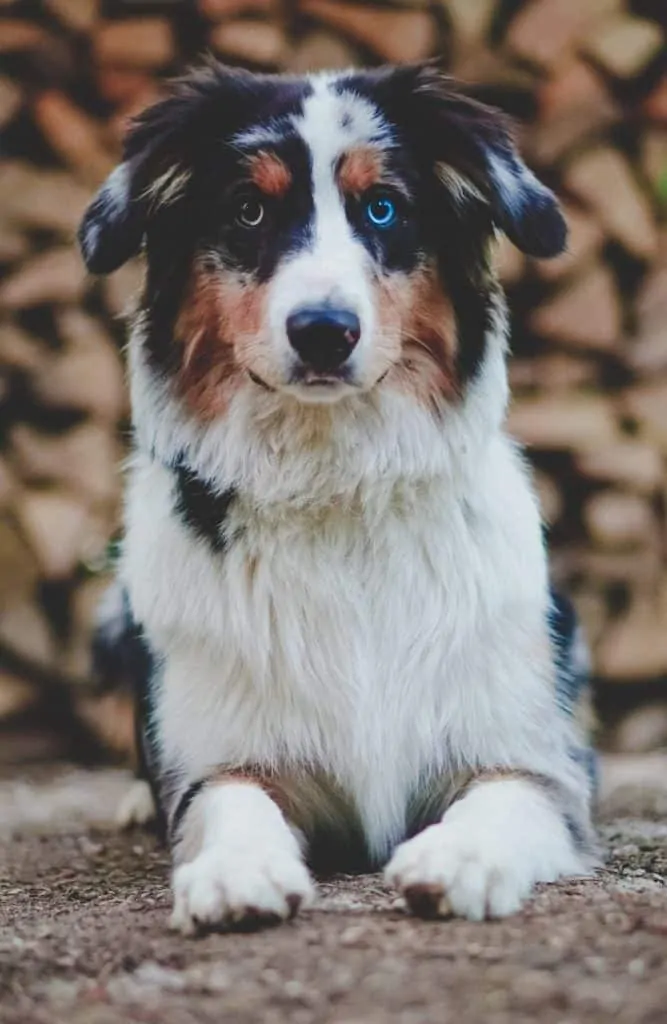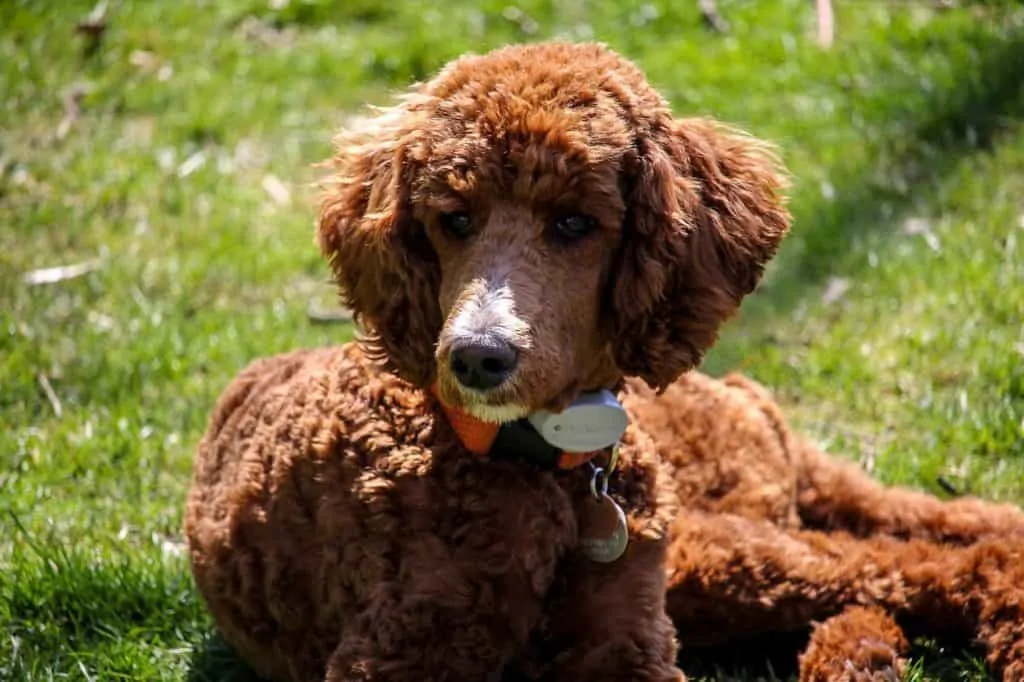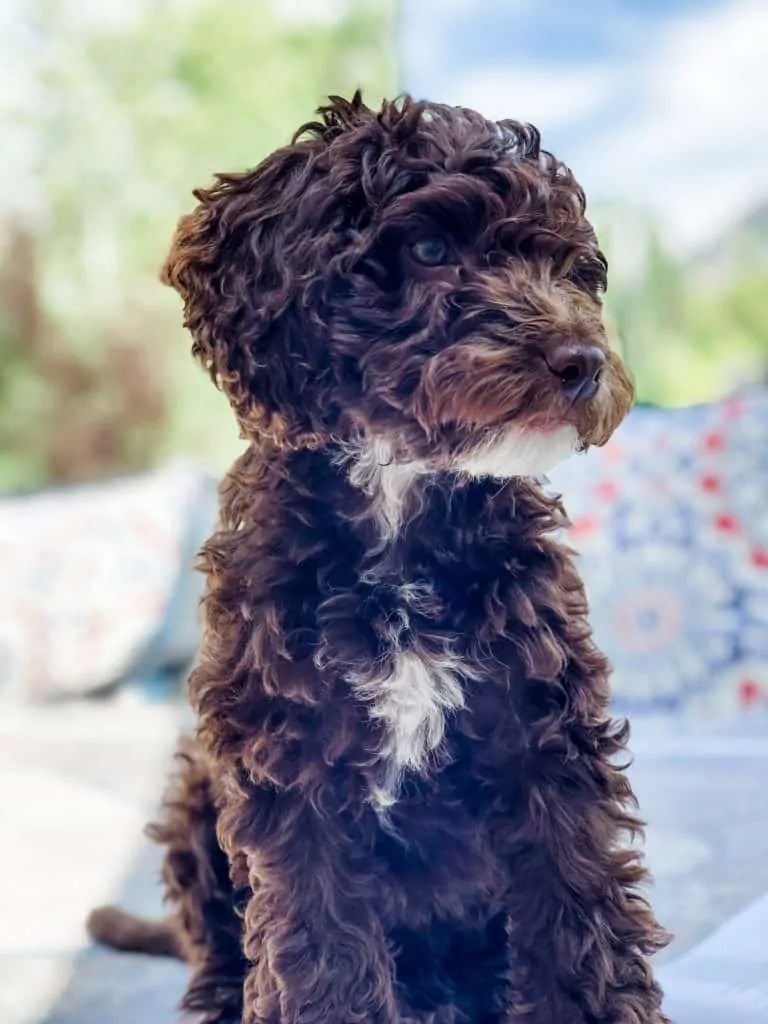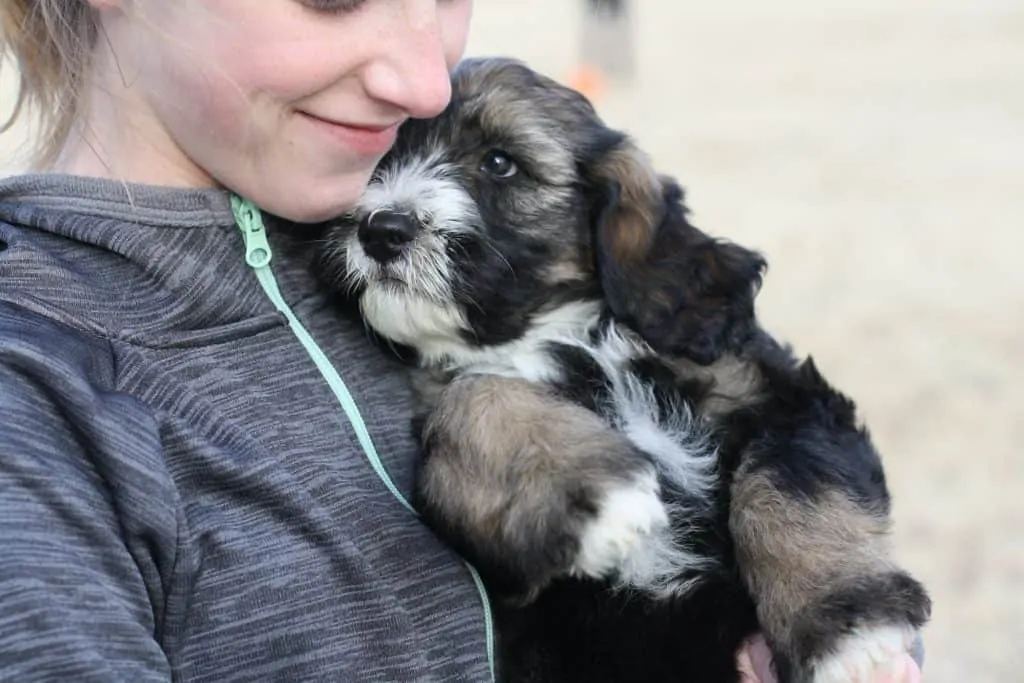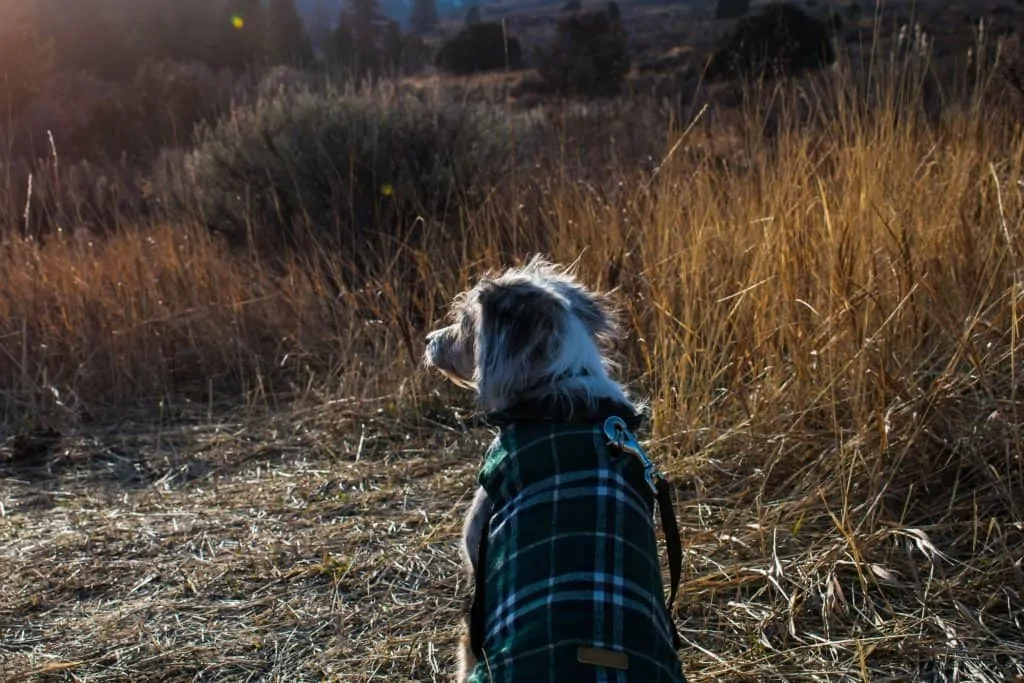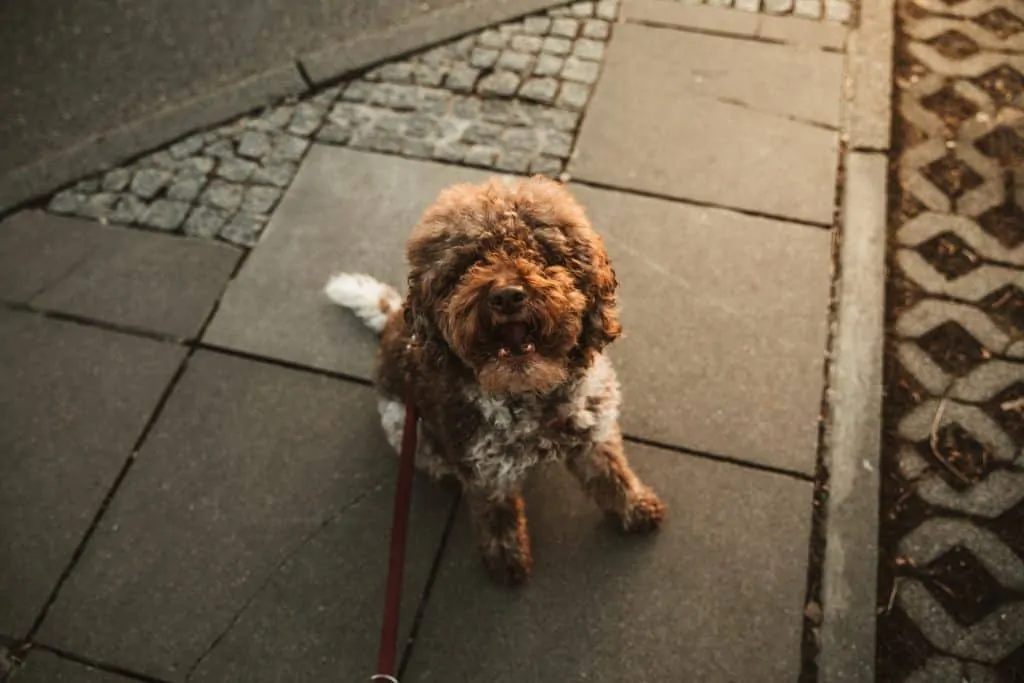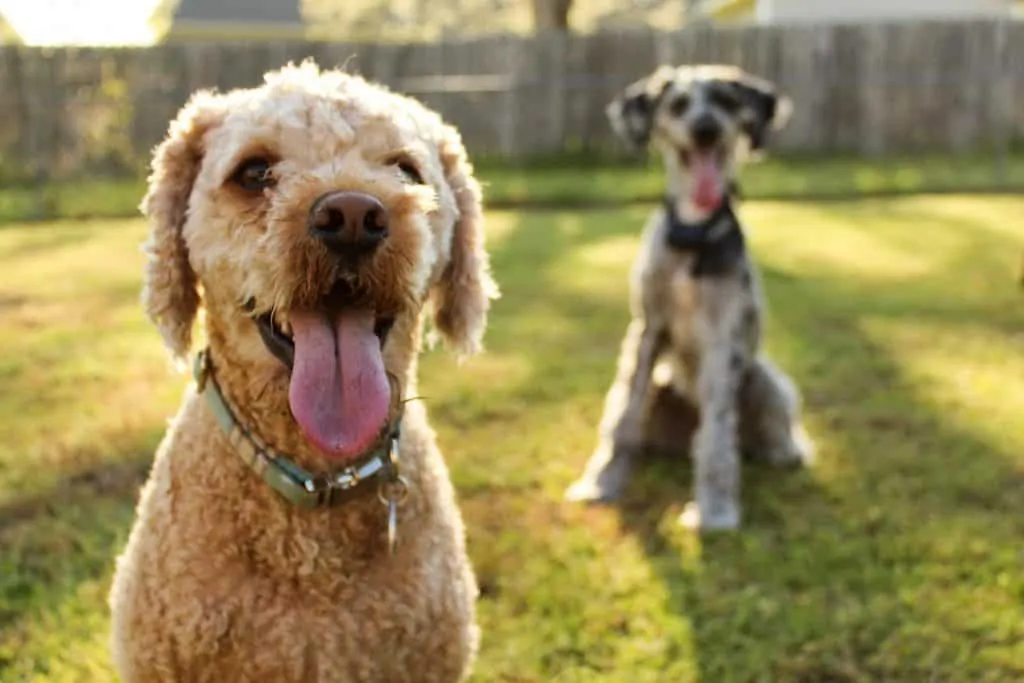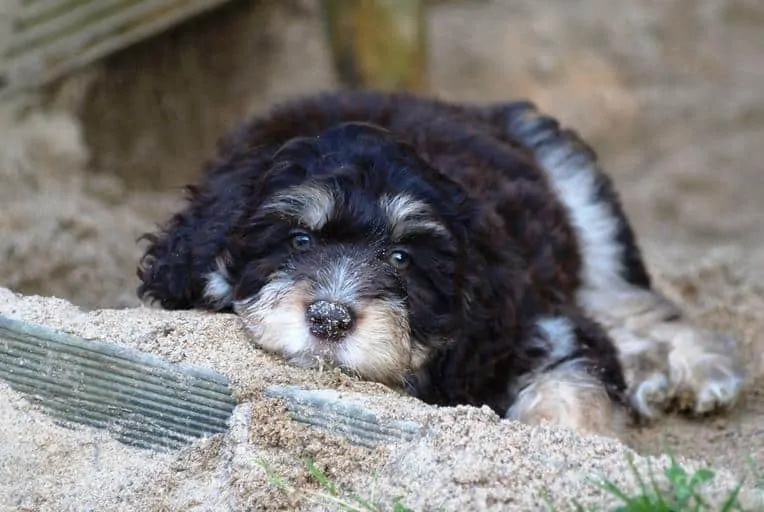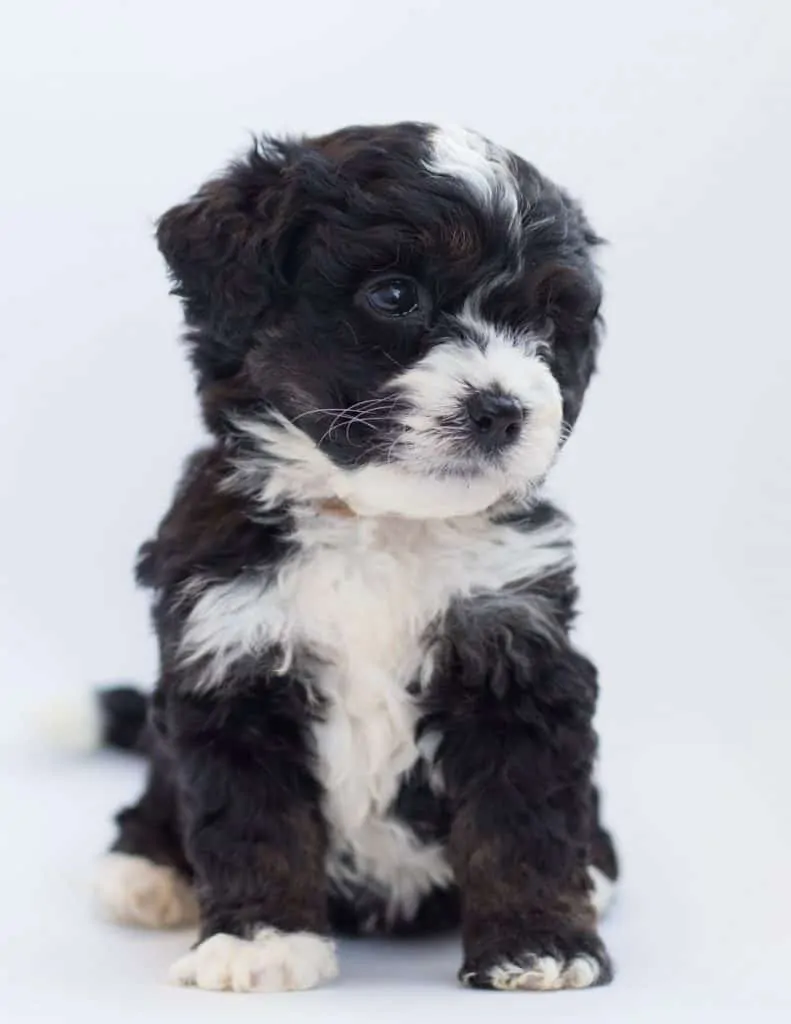If you’re looking for a gorgeous, clever, and family-friendly dog you can take with you on all your adventures, then we highly recommend you check out the Aussiedoodle.
Known for his stunning looks, cunning disposition and loving personality, the Aussiedoodle dog, AKA the Aussiepoo, is a wonderful addition to any family with kiddos, other pets, and an adventurous lifestyle.
That said, this cute crossbreed isn’t right for everyone. Here are 15 things you should know before getting an Aussiedoodle.
Contents
1. The Aussiedoodle Mix Is Considered A Designer Dog Breed
Aussiepoos are not purebred dogs, nor are they considered mutts.
Neither a purebred nor a mutt, the Aussiedoodle dog is what many people consider a designer dog breed. This means he was purposefully bred and is the offspring of two chosen purebred parents in the hopes of creating a dog with a combination of these two breeds’ looks and qualities.
Also known as a crossbreed, hybrid, and mixed breed, designer dog breeds are not only a booming trend in the United States, they are also surrounded by controversy.
While crossbreeding has been ongoing for centuries, it is only within the last 20 years or so that first and second generation crossbreeds have made their way into the homes of dog lovers as companion dogs.
What are first and second generation crossbreeds? Let’s find out.
First Generation Crossbreeds (F1)
A first generation crossbreed is a dog who is the direct offspring of two different purebred parent dogs. For example, a first generation Aussidedoodle’s parents will be a purebred Poodle and a purebred Australian Shepherd.
Second Generation Crossbreeds (F2)
A second generation crossbreed is a dog who is the offspring of two first generation crossbreeds. For example, if you have a second generation Aussiedoodle, or an F2 Aussiedoodle, that dog’s parents are also Aussiedoodles.
If it sounds complicated, that’s because it is. This, (and the unpredictability of newer generation crossbreed dogs), is part of the controversy surrounding modern-day crossbreeding.
But as we mentioned above, crossbreeding is nothing new. You see, most purebred dogs we know and love today were once first and second generation crossbreeds themselves. Over time, they were mixed with a number of different purebred dogs through generations in the hopes of perfecting their qualities and appearances for certain tasks.
Today, most dogs are kept as companions and are generally not needed for working purposes. That said, crossbreeding has gone from being an essential part of progression to being based more on what is in trend or otherwise desired by the everyday dog lover as far as companionship goes.
There are several reasons why some would discourage the selling of F1 and F2 generation crossbreeds as companion dogs, with some claiming that designer dogs like the Aussiedoodle are potentially less predictable as far as temperament, health, and physical appearance.
On the flip side, other experts insist that crossbreed dogs are potentially healthier than purebred dogs and that their temperament and appearance can be foreseen to a degree using responsible breeding practices.
Of course, this is still up for debate and the verdict is still out. As such, crossbreed dogs continue to rise in popularity. And while many doodle mixes are well-known these days (you surely know about the labradoodle, maltipoo, and goldendoodle), there is a new doodle dog climbing the ranks.
Enter the Aussiedoodle!
2. The Aussiedoodle Is A Cross Between the Australian Shepherd and The Poodle
It was only a matter of time before breeders realized what a potential goldmine the Aussiedoodle could become. This mixed breed, a combination of two of the world’s most intelligent and sought after purebred dogs, was sure to be a hit.
But what makes the Aussiedoodle dog so special? To understand more about this dynamic, intelligent, and beautiful hybrid, we need to take a closer look at his parent breeds.
The Australian Shepherd
Aussie’s are both beautiful and brainy.
Also known as the Aussie, the Australian Shepherd is an Australian born breed who was perfected in California by ranchers in need of a stellar herding dog. Once considered a cowboy’s best friend, the Australian Shepherd is renowned for his shepherding skills and is still one of the top ranch dogs found throughout the west today.
This working dog is cunningly intelligent, athletic, and focused. His gorgeous looks mesh with an enthusiastic personality and his work ethic is incomparable. With a need to please and an eagerness to have purpose, the Aussie and any Australian Shepherd mix, for that matter, must be given a job to do in order to be happy.
The Poodle
The Poodle is intelligent and dignified.
Like his Aussie counterpart, the Poodle has a deceiving history. Due to being known as the French Poodle, many assume this glamorous dog hails from France when actually the Poodle was originally bred and perfected in Germany as a waterdog.
Before his flamboyant haircut became a fashion statement for French noblewomen, it was originally designed to protect the Poodle from the cold, harsh German waters where he would retrieve ducks and other prey for his masters.
Along with being a successful water dog, the Poodle also found himself the center of attention in circus acts, street performances, and eventually on the laps of nobility throughout Europe.
Today, the Poodle is available in three size variations including standard, toy and miniature. The Poodle is an excellent family dog and is eager to please, quick to learn, and enjoys being the family comedian and star.
3. Aussiedoodle Dogs Are Extremely Intelligent
Aussiedoodle are super smart and need an owner who can harness that intelligence early on.
Seeing as both his parent breeds are so clever, it’s no surprise that the Aussiedoodle will be just as intelligent. However, it’s important for any potential Aussiedoodle dog owner to prepare for such a smart dog and keep in mind that clever pups are not always easy.
It’s a common misconception that the smarter the dog is the easier it is to train. On the contrary, very intelligent dogs can be difficult as they are prone to becoming bored quickly and are more at risk of suffering from anxiety, stress, and behavioural problems if not given enough mental stimulation.
Intelligent dogs like the Aussiedoodle also have the potential of outwitting their human parents. Many of them are excellent escape artists who can learn to open doors, sneak food from the fridge, and even manipulate extra treats from their unwitting family members.
A good Aussiedoodle owner will have a healthy respect for this mixed breeds potential and will be able to harness their incredible intelligence by ensuring their dog is kept busy and active.
Providing your Aussiedoodle with jobs to do around the home, plenty of exercise, and lots of interesting and ever-changing training sessions can ensure your pup stays happy, active, and thriving.
4. Aussiedoodle Dogs Have The Potential To Be Hypoallergenic, But There’s A Catch
Aussiedoodle dogs could be hypoallergenic like their poodle parent or they could have a coat more like their Aussie parent, like this Aussiedoodle has.
The Aussiedoodle is a mix between two different dog breeds, and both breeds have different coat types.
Unless you end up with a second or third generation Aussiedoodle, the predictability of his coat type can be left up to chance.
Australian Shepherds have thick, double-layered coats that shed heavily, especially during shedding season in spring and fall. The Poodle, on the other hand, has a dense, curly coat that is hypoallergenic and does not shed or produce as much allergy-inducing dandar.
If you or someone in your family suffers from allergies and you are looking for a hypoallergenic Aussiedoodle, it would be best to seek a second or third generation Aussiedoodle who was bred specifically to have a hypoallergenic coat more like his Poodle parent.
5. Your Aussiedoodle Dog’s Appearance Will Vary Depending On The Traits He Inherits From his Parent Breeds
This Aussiedoodle takes more after his poodle parent as far as his coat texture.
Just as his coat type can vary depending on his generation and, of course, his genetics, your Aussiedoodle’s appearance could also vary. Poodles and Australian Shepherd dogs look very different from one another, and an Aussiedoodle puppy could inherit any number of physical genetic traits from his parent breeds.
Again, if you want a more predictable looking Aussiedoodle, it is best to look for a second or third generation Aussiedoodle as opposed to a first generation mix. You should also note that the size and weight of your Aussiedoodle will depend on the Poodle parent he is mixed with and that there are two size varieties of the Aussiedoodle, including the standard Aussiedoodle and the mini Aussiedoodle.
On average, a second or third generation Aussiedoodle will have the following traits:
Standard Aussiedoodle Height: 14 to 23 inches
Standard Aussiedoodle Weight: 25 to 70 Pounds
Mini Aussiedoodle Height: 10 – 15 inches
Mini Aussiedoodle Weight: 10 to 15 pounds
Aussiedoodle Coat Color: Blue merle, red merle, black and red, black and tan, sable, parti, tan, black and white, and (rarely) solid black, white, red or tan.
Aussiedoodle Coat Type: Wavy, double coat, shedding, OR wavy and hypoallergenic.
Aussiedoodle Eye Color: Brown, hazel, green, blue, or one blue eye and one brown eye.
6. The Aussiedoodle Is A Great Dog For Hands-On and Adventurous Dog Owners
Aussiepoo dogs are adventurous and fun-loving.
The purebred Australian Shepherd is a working breed at heart and the Poodle is an intelligent, athletic dog with lots of energy.
As such, an Aussiedoodle is going to need an owner who is very hands-on and willing to commit lots of time, energy and patience to this brainy and active crossbreed. This dog will appeal to most dog lovers who have active lifestyles, including those who love the outdoors and enjoy hiking, camping, road trips, and other forms of energetic, adventurous travel.
The Aussiedoodle will also enjoy swimming, jogging, games of fetch, and lots of playtime with other pets or children. They will not do well in homes with owners who are gone often or don’t have time to play, train, and exercise them every day.
We should also note that Aussiedoodles are not designed to be easygoing lap dogs, though they will enjoy a good nap every now and then after a good days’ work or play.
That said, the Aussiedoodle is built for fun and family. He bonds strongly with his people and could be prone to anxiety, depression and destructive behaviors if his social, mental and physical needs are not met.
7. The Average Lifespan of an Aussiedoodle Dog Is Around 10 – 12 Years
Healthy Aussiedoodle’s can live up to 12 years and sometimes longer.
On average, a healthy Aussiedoodle can live for up to 12 years. However, there have been reports of Aussiedoodle dogs living longer, which isn’t a surprise considering their purebred Poodle parent has a lifespan of up to 18 years.
Like all dogs, diet, lifestyle, and genetics will play a role in your Aussiedoodle’s overall health and lifespan. That said, there are some things you can do to aid in your dog’s quality of life and vitality.
Keeping your dog on a high-quality diet specified for his age, weight and activity level can ensure he stays healthy and even help prevent future health issues. We also recommend keeping up with routine veterinary visits and wellness checks, ensuring your dog is up to date on his vaccines, and sticking to a good grooming routine to help keep your Aussiedoodle’s skin, coat, and body healthy.
Exercise can also play a major role in your Aussiedoodle’s health and lifespan, but we will talk more about that further down.
For now, let’s take a look at the potential genetic health issues your Aussidedoodle could face.
8. The Aussiedoodle Is Susceptible To A Number Of Health Concerns Owners Should Be Aware Of
Like all dogs, the Aussiedoodle can be prone to a number of health issues.
Your Aussiedoodle can be susceptible to any of the genetic health issues his parent breeds are susceptible to. Luckily, both the Australian Shepherd and the Poodle are generally healthy, vibrant breeds.
Still, they do have the potential of passing on some serious genetic issues to their crossbreed offspring, including but not limited to:
- Cataracts
- Hip dysplasia
- Progressive retinal atrophy
- Autoimmune thyroiditis
- Sebaceous adenitis
- And Epilepsy
While some genetic health issues are difficult to prevent, you can lower the risk of winding up with an unhealthy Aussiedoodle puppy by being careful who you get your puppy from.
Going through reputable breeders or shelters are often the only way you can ensure your puppy or dog has been health screened and cleared for any serious and potentially expensive or even deadly health issues.
9. Aussiedoodle Dogs Make Wonderful Therapy Dogs
Because they are so intune with people and so intelligent, Aussiepoo’s make wonderful therapy dogs.
When we think of therapy dogs, we often think of golden retrievers or labradors. Lately, mixed dogs like labradoodles, goldendoodles, and now Aussiedoodles have also joined the ranks as some of the most sought-after therapy dogs in the US.
Aussiedoodles make especially good service dogs because they enjoy having a job to do. They take their work seriously and are quick to learn, easy to train, and bond very well with their human counterparts.
Some of the therapy work Aussiedoodles partake in include emotional support, guide dog work, and emotional therapy assistance for hospitals, nursing homes, and victims advocacy groups.
10. Like All Dogs, Aussiedoodle Dogs Should Be Well Socialized and Trained At An Early Age
Aussiedoodle puppies should be properly socialized to ensure they grow up happy and well-rounded.
All dogs need to be properly socialized and trained at an early age, and the Aussiedoodle, who is very intelligent and therefore more prone to suffering from anxiety, will especially benefit from this rule.
Aussiedoodle dogs should be out and about with you as often as possible during puppyhood and introduced to different circumstances, people, places and things. Some of the best ways to properly socialize any puppy is to ensure that every new experience they encounter is positive.
You can help your Aussiedoodle grow up happy and healthy by introducing him to car rides, groomers, children, strangers, loud noises, airplanes, and more in a positive way to ensure he is well-rounded.
We also suggest gently handling your Aussiedoodle’s paws, ears, face and tail often during puppyhood to help him get used to having these sensitive areas touched.
11. Aussiedoodle Dogs Must Eat A High-Protein Diet Specified To Their Age and Weight
Because they are so active, Aussiedoodle dogs need a diet high in protein.
As we mentioned briefly above, one of the best ways to ensure your Aussiedoodle dog’s overall health is to make sure he eats a quality dog food that is specified for his age, weight and activity level.
Active and energetic Aussiedoodle dogs should eat dog food that is high in protein and has a balanced amount of carbohydrates, vitamins, minerals, fats and other nutrients.
We also suggest making sure your dog’s food is free of fillers, additives, byproducts, and artificial flavors.
While some quality dog foods and dog food brands can be expensive, there are still a number of excellent dog foods that come highly recommended which are inexpensive and effective.
You also have the option of feeding your Aussiedoodle dry dog food, wet dog food, or raw dog food. You may even choose to make your dog’s food yourself, though it is best to do this under a veterinarian’s supervision to ensure your Aussiedoodle is getting all the proper nutrients he needs to thrive.
12. Aussiedoodle Dogs Must Have Plenty Of Daily Exercise and Mental Stimulation To Prevent Anxiety and Boredom
Exercising and training your Aussiedoodle is important for his mental and physical health.
Along with maintaining a healthy, balanced diet, your Aussiedoodle should also get plenty of daily exercise and mental stimulation.
Remember, Aussiedoodle dogs are highly active and intelligent. They can easily become depressed, anxious, bored and destructive if their physical and mental needs are not met.
As far as exercise goes for an Aussiedoodle, experts recommend at least two good walks each day along with plenty of outdoor playtime. Aussiedoodles will make wonderful jogging partners as well, and will enjoy swimming, hiking, and other active, outdoor ventures.
As they are so social, your Aussiedoodle might also enjoy trips to the dog park.
Mental stimulation is just as important as physical activity when it comes to this mixed breed, so try and incorporate plenty of it. While consistently coming up with new ways to keep your Aussiedoodle entertained can be a bit daunting to first-time dog owners, you can make it benefit you as well by giving your Aussiedoodle jobs around the home.
Many people find that their Aussiedoodle is a great help when it comes to household chores. Aussiedoodles have been able to learn how to sort laundry, carry in groceries, and even load the dishwasher.
You can also help keep your Aussiedoodle happy and mentally stimulated by investing in challenging puzzle toys that make him think.
When it comes to training, remember that Aussiedoodles respond best to positive reinforcement methods like treats and praise. Punishments like scolding should be avoided, as Aussiedoodle dogs can be quick to shut down if they sense you are frustrated.
Try to keep training sessions short and do them in five-minute bursts throughout the day. If you sense your pup is getting bored, take a play break instead of trying to push through.
13. Aussiedoodles Get Along Great With Children and Other Pets
Aussiedoodle dogs are social and will enjoy playing with other dogs and children.
Don’t let having children or other pets in the home deter you from considering getting an Aussiedoodle. These brilliant crossbreed dogs are very social and get along well with nearly everyone. They enjoy the energy of children and will love playing with other pets.
That said, Aussiedoodles could have a high prey drive, as the Poodle in them was once bred for hunting, so watch your Aussiedoodle around smaller pets like rodents and birds.
Your Aussiedoodle will likely also have some strong herding instincts, thanks to his Aussie parent breed.
For this reason, your Aussiedoodle could be prone to exhibiting herding instinct and may find it his duty to round up the children or smaller pets. This can be annoying and even frightening to smaller kids who don’t understand.
As such, it is always important to monitor young children around dogs and to teach kiddos how to properly interact with pets in and out of the home.
14. Depending On Their Coat Type, Aussiedoodles Need Moderate to Extensive Grooming
Aussiedoodle’s don’t need to be bathed frequently unless they get particularly dirty.
If your Aussiedoodle is a first generation mix, he could have a coat that is more along the lines of his purebred Australian Shepherd parent breed. If this is the case, your Aussiedoodle will likely need more extensive grooming and may be a heavy shedder.
We recommend investing in a quality deshedding brush and other grooming tools that will help keep your Aussiedoodle’s coat healthy and mat-free.
Even if your Aussiedoodle is hypoallergenic, his coat will need moderate care. Many owners opt to keep their Aussiedoodle dog’s fur short in order to better maintain a mat-free coat, while others opt to brush their Aussiedoodle a few times a week.
Along with proper grooming, your Aussiedoodle will need his ears checked and cleaned regularly to ensure they are free of debris, waxy buildup and moisture to help prevent ear infections. His nails will need to be trimmed regularly to prevent them from cracking or splitting, and his teeth should be brushed daily using a quality dog toothbrush and a dog-safe toothpaste.
Aussiedoodle dogs do not need to be bathed often and do best with a good bath every six to eight weeks, unless they get particularly dirty.
15. It’s Important To Go Through Reputable Sources When Buying or Rescuing An Aussiedoodle
Aussiedoodle puppies can be expensive when going through a reputable source.
Aussiedoodle dogs are very popular in the United States, and for this reason they can be expensive, especially when going through a reputable breeder. On average, Aussiedoodle puppies can cost between $1,500 and $5,000.
The price of your Aussiedoodle could be more or less than that depending on the breeder and the quality of the parent breeds.
With that being said, it’s important not to try and cut corners or avoid paying a high price for an Aussiedoodle by going through backyard breeders and online sellers. While these sources may be able to offer you a discounted price for an Aussiedoodle puppy, you could wind up spending much more in the long run if that puppy is sick.
One of the benefits of going through a reputable breeder to get your Aussiedoodle puppy is that you can ask for a certificate of health. Health certificates are often issued by breeders to prove their puppies have undergone health screenings for any of the major health issues prevalent in Aussiedoodle crossbreeds.
You may also be able to see your Aussiedoodle puppy’s parents. Seeing the parents can help give you a better idea of what your Aussiedoodle will grow up to look like, especially if those parents are second generation crossbreeds and Aussiedoodle dogs themselves.
If you are concerned about the price of an Aussiedoodle from a reputable breeder, we suggest looking into adopting one from a shelter. There are many shelters throughout the United States that specialize in doodle mixes like the Aussiedoodle and should be able to help you find the dog of your dreams.
Rescuing a dog is generally a fraction of the price of buying one from a breeder. Many shelters also include a free initial vet exam with their dogs, and some dogs are even trained and go through behavioral testing before being adopted out.
Best of all, when you rescue a dog from a shelter, you are offering a homeless dog a good family and making room in that shelter for another dog in need.
It’s a win-win for everyone!
Our Three Favorite Products For Aussiedoodle Dogs and Owners
Along with covering the 15 things you should know before getting an Aussiedoodle, it’s also important to take a look at the products you are going to need to be the best Aussiedoodle parent possible.
If you’re not sure where to begin looking for products like food, leashes and grooming essentials, don’t worry. We have listed some of our favorite products every Aussiedoodle and Aussiedoodle owner should know about.
Take a look.
IOKHEIRA Dog Grooming Dematting Kit
No products found.
Aussiedoodles have a unique coat that is a combination of both their Australian Shepherd and Poodle parent breeds. For this reason, it’s a good idea to invest in a grooming kit that offers you a dematting comb, an undercoat brush, and a deshedding tool to help keep your Aussiedoodle’s coat as healthy as possible.
The above kit includes three such tools that are designed to effectively and painlessly brush and demat your Aussiedoodle. These tools are designed to work well for dogs with medium length hair, making them perfect for Aussiedoodle coats.
Nina Ottosson Interactive Puzzle Toy Level 4
No products found.
Puzzle toys are going to be incredibly beneficial for your clever Aussiedoodle, and that’s why we’ve listed the above puzzle toy by the Outward Hound. This puzzle toy is a level 4, which means it is the most challenging for dogs and for pups with advanced intelligence.
You may need to start off with easier level toys for your Aussiedoodle, but don’t be surprised if he very quickly advances to more challenging levels.
No-Pull Freedom Harness and Leash
No products found.
Walking is going to be a huge part of your Aussiedoodle dog’s life, so investing in a quality dog harness and leash is very important. We recommend the above leash and harness set by 2 Hounds Design. This is a No-Pull Freedom Harness which includes a double-clasp leash designed to reduce pulling and making walking more comfortable for both you and your dog.
We often use these harnesses for training, as they help to reduce dogs from pulling and teach them better loose-leash manners. The harness is also safer for active dogs as it does not put dangerous pressure on their throat and trachea.
So, what do you think? Has this article made you realize that the smart, sweet, and active Aussiedoodle is your doggy soulmate, or would you prefer to keep looking for your perfect match?
Let us know your thoughts about the Aussiedoodle in the comment section below.
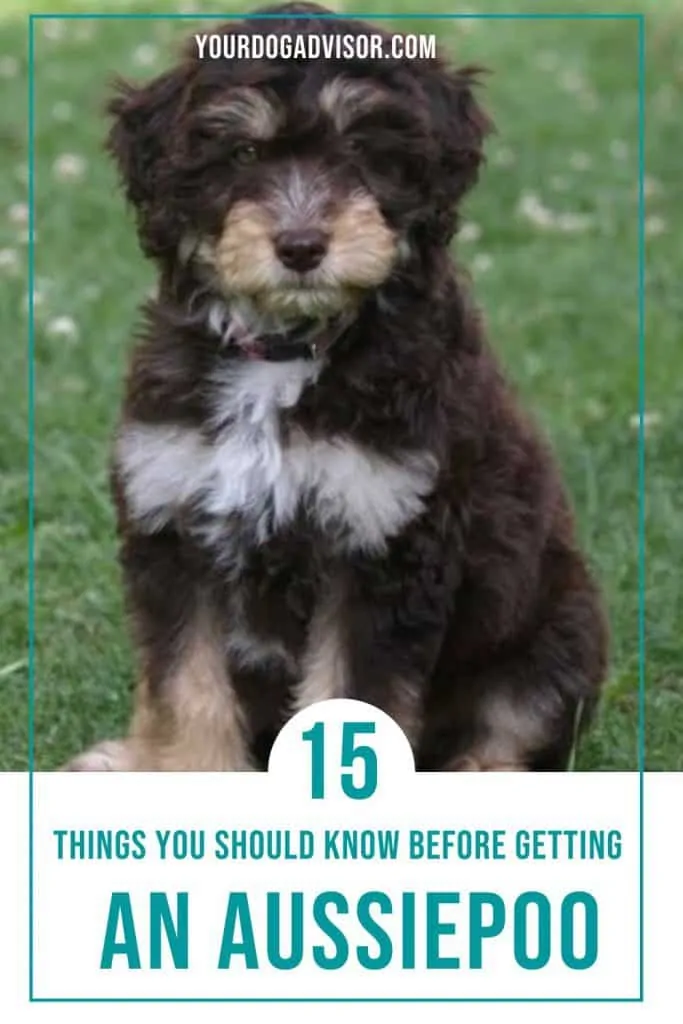

Jen Jones is a professional dog trainer and behavior specialist with more than 25 years of experience. As the founder of ‘Your Dog Advisor’ and the ‘Canine Connection’ rehabilitation center, she applies a holistic, empathetic approach, aiming to address root causes rather than merely treating symptoms.
Well known for her intuitive and compassionate approach, Jen adopts scientifically-proven, reward-based methods, encouraging positive reinforcement over punishment. Jen specializes in obedience training, behavior modification, and puppy socialization. Her innovative methods, particularly in addressing anxiety and aggression issues, have been widely recognized. Jen has worked with many of the world’s leading dog behaviorists and in her free time volunteers with local animal shelters and rescue groups.
